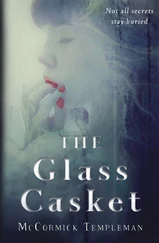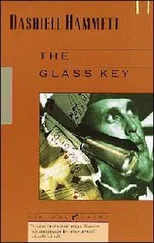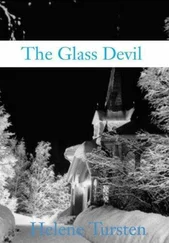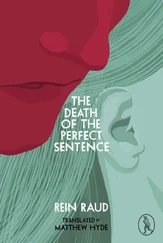Veressa turned back to Shadrack. “Where do you think we are? How close are we to finding the way out?”
“We have traveled about three miles from the Nochtland palace,” he said. “Three miles southeast. Would you agree, Sophia?”
Sophia nodded distractedly. “Three miles,” she said, gazing out at the deserted city. She could see, even from a distance and in the pale light cast by the trees, that the buildings were encrusted with centuries of mineral growth: rough, sparkling surfaces like rock salt covered the walls and roofs and the tall posts that must have once been lamps. How long has it been , she wondered, since someone set foot here ? The thrill of discovery, the longing for exploration that she had heard in her uncle’s voice, flitted briefly through her. Maybe Grandmother Pearl’s story was real , she thought . Maybe the boy who destroyed the city will be here.
Veressa bent over the map, frowning as she drew her finger along the winding underground route. “Traveling southeast three miles. Where would we be above ground? There is no road here. This is . . .” she trailed off. Then her eyes widened. “This is Lake Cececpan. We are almost beneath it. The lake must be”—she lifted her head to look across the cavern—“almost directly above us.” They raised their eyes collectively to the ceiling, as if expecting to see the lake there, hanging overhead.
“Lake Cececpan,” Shadrack repeated. “Could it be—”
“It is a great coincidence, if nothing else,” Veressa cut in, putting the map down. “But the location of the carta mayor does not matter,” she said firmly. “We are looking for the exit, and I believe the exit will be just beside the lake. If Sophia’s idea about the flowers is correct, the passage will be somewhere here.”
“I agree. It must lie somewhere in the city.”
“In the city?” Veressa echoed doubtfully. “Surely it is more likely to be in the cavern wall?”
Sophia drew herself away from the alluring view of the city. “Yes, I think so, too—it would be in the wall.”
“The passage may go down before it goes up,” Shadrack insisted, walking forward. Logic and experience suggested that Veressa and Sophia were right, but the abandoned city posed too great a temptation. It lay there untouched, quiet and full of mystery, waiting to be explored.
“Searching the city for an entrance will take so long,” Veressa objected. “The rest of us can walk the perimeter of the cavern to save time.”
Shadrack hesitated. “Very well—we can keep sight of each other with the torches.”
“And the trees!” Martin added. “I can drop seeds, and those will illuminate the way.”
“Fine,” Shadrack agreed. “Theo and Sophia can come with me. Burr, Calixta—you go with Veressa and Martin along the perimeter.”
“Take some seeds, Sophia,” Martin said, handing her a small fistful from another pocket.
As the pirates and the Metls withdrew, Sophia walked alongside Theo and Shadrack, dropping seeds. The towering trees blossomed behind them, and she saw another line rise up along the cavern’s edge. Soon even the darkest corners were faintly illuminated by the silvery light, and Sophia looked up with awe at the high, domed ceiling. She squinted, seeing a dark patch high on the wall. “Look,” she said to Shadrack. “Doesn’t that look like a hole or a doorway?”
“It may be,” he said absently, glancing upward only briefly. “If it is, Veressa will find it.”
Sophia noticed a shadowy line zigzagging away from the dark spot. “Those might even be stairs leading up to it.”
They had reached the entrance, and Shadrack paused for a moment, resting his hand against the greenish archway. The gates, like the rest of the city, were encrusted with mineral deposits that made them glitter in the silver light. The lacy trelliswork of the arch overhead had broken in places, disintegrated by the salty air and the chalky limestone. “Quite ancient,” Shadrack remarked. “And not from this Age. We are in the presence of something I had never thought to see,” he said. “The ruins of a future Age. Remarkable. This opportunity may never come again,” he said, drawing Theo and Sophia toward the gates. “We are a fortunate few. Even if we never emerge from this place, we have been privileged to see it.”
“But we will emerge from it?” Sophia asked anxiously.
Shadrack seemed not to hear her. “Come—let’s search the city.”
It was impossible to know what the buildings had originally looked like, for they were utterly transformed. High towers, connected to one other by bridges, created a second network of passageways above the streets. Many of the doorways had calcified, their doors sealed shut forever. Others stood open like sad, drooping eyes, their empty rooms staring out blindly. The ground beneath their feet was hard, but the seeds Sophia dropped threw roots nonetheless, breaking through the rock and sprouting quickly into silvery vines that climbed up the limestone walls and burst into brilliant bloom, releasing a sweet scent. There was no sign of human life; the buildings were empty of even the sparest furniture. The most visible mark left by the people who had inhabited the city were the sculptures that stood in front of almost every building. Cut from pale green stone, like those in the subterranean garden, they were deformed beyond recognition by the calcite. Had they not appeared unmistakably shaped by human hands, it would almost have seemed possible that the entire city was nothing more than a fantastic sculpture built by the earth itself.
They had seen nothing in the city to suggest a passageway or stairway leading aboveground. Sophia had lost sight of the others circling the perimeter, though she thought she could hear them over the constant sound of running water. Their voices drifted suddenly toward her; low and distorted by the echo in the chamber, they sounded like different voices altogether. She paused for a moment, straining anxiously to hear, and then the strange voices faded and the bubbling water that wound its way through the city in pale, shallow gutters drowned them out. She shook her head to clear it and walked on.
She was on the verge of reminding Shadrack about the staircase cut high in the wall when something else caught her attention. She stopped in her tracks. There was something odd in the air, she realized: a smell—no, a temperature change. It was suddenly almost freezing.
Theo and Shadrack had stopped as well, and they turned to look at one another. “Is it colder in here?” Theo asked. His own words answered him as his breath turned white.
Sophia knew what was coming, but she did not feel afraid, only shocked. They were too late; the change had come. The glaciers were moving overhead. A sudden rumbling sound, like the roar of a storm, exploded all around them. The ground began to shake, as if quivering under the weight of some unbearably heavy mass, and the buildings around them shuddered. Then the walls of earth groaned in agony, and Sophia felt certain that they would burst, crumbling to pieces before her eyes. Suddenly, as quickly as it had begun, the groaning stopped and the city grew still. Sophia looked around her, stunned. Is that it? she thought. Why are we still here? She had dropped to the ground and she stayed there, crouching warily. The dirt beneath her fingers was still reassuringly warm. She looked at Shadrack and Theo, who wore similar expressions of confusion.
Then she heard another sound—one that was entirely unexpected: the crack of a pistol. The pirates don’t have their pistols, Sophia thought, bewildered. Suddenly a sharp report echoed just over her head, and a chunk of calcified rock crashed to the ground beside her. She turned, hardly believing her eyes: crouched low by one of the towers was a Sandman, pointing his revolver directly toward her. Three other men standing beside him took aim.
Читать дальше












